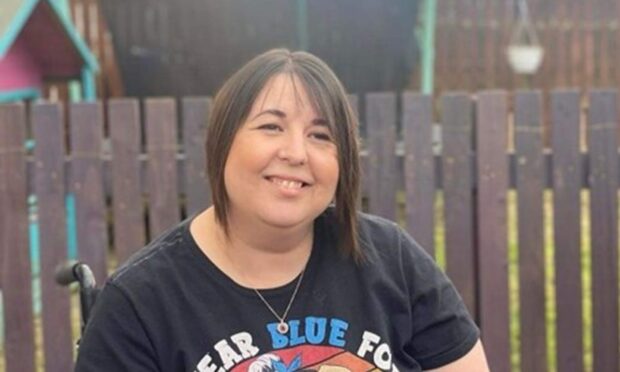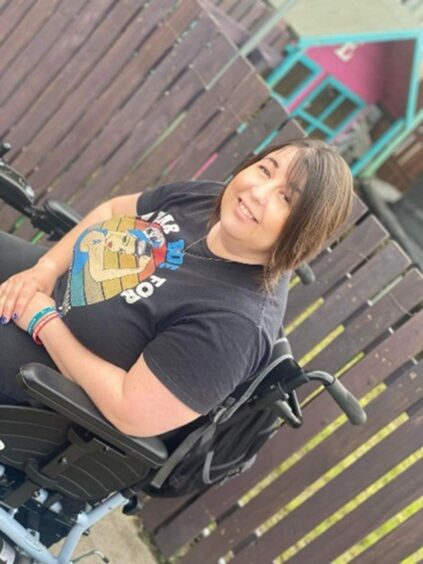In 2020 Tanya Tasker, from St Andrews, was a newly married mum who worked as a nanny and was looking forward to starting a new job at a nursery.
But when she was diagnosed with a devastating neurological condition that March, after suffering from severe pain, Tanya had to put everything on hold.
She was rushed to hospital with severe back pain at the start of the first lockdown, when it was discovered she had a rare condition called cauda equina syndrome.
And two years on, Tanya is still struggling with the long-term effects of the condition.
‘Our lives have been flipped upside down’
Tanya, 39, explains: “I have no proper control of my bladder or bowels, which has a huge impact on my daily life.
“I have to use a catheter and an irrigation system to empty my bowels.
“My husband had to give up one of his jobs as a retained fire fighter to help care for me. Our whole lives have been flipped upside down.
“I needed help with everything personally and around the house.
“I’m using crutches around my house and I’m in a wheelchair outside. I can only walk a short distance and had to have a lot of adaptions around the house.
“We now have two bannisters to help me up and down the stairs and I’m waiting for a wet room to be put in.”
Struggle for support
Tanya, like many others who are diagnosed with a neurological condition, struggled to access the support she needed.
The Fifer continues: “I have not seen my surgeon since my operation because of Covid-19.
“I struggled to get them to refer me to a neuropsychologist as I was home and struggling badly with the way I now was.
“Eventually I got one, but the appointment was by phone only because of Covid, along with physio.
“I got one closer to home who was my lifesaver as she then told me about all the help that was out there for me and reached out to so many of her colleagues to help me.
“This was about six months after my condition was found.”
‘I felt like I wasn’t a mum anymore’
The mum-of-one and stepmum-of-three is speaking out after new research found 37% of adults with a neurological condition in Scotland wait more than a year for a diagnosis.
The findings, from Neurological Alliance Scotland, also revealed 80% of adults said their neurological condition negatively impacts their mental health – something Tanya can relate to.
She says: “At the beginning it was horrendous. I was really struggling, having breakdowns constantly and needed somebody to talk to.
“I didn’t want to go outside in my wheelchair, I was scared of being stared at or having an accident.
“Covid was actually quite good for me because it gave me an excuse to stay inside. I could just lock myself away.
This #MentalHealthAwarenessWeek we'd like to draw your attention to the difficulties people with neurological conditions face accessing mental health support. Many of our member charities provide information to support your mental health. https://t.co/g4MM3WyCmM pic.twitter.com/mmLpA0SihY
— Neurological Alliance of Scotland (@NeuroAlScotland) May 10, 2022
“The worst part was: I felt like I wasn’t a mum anymore. I just couldn’t do the same things with my daughter as I could before.
“It’s getting better now, though. I’m more understanding and accepting of my condition now.
“I was put in touch with a support group through my spinal physiotherapist. I was also able to do a wellbeing course through them.
“It’s been great to speak to other people going through something similar.
“I can also do things like take my daughter to school by myself now, in my wheelchair.
“She knows I maybe can’t do the things I used to, but I’m able to do them with her in a different way.”
What is cauda equina syndrome?
Cauda equina syndrome is a rare and severe spinal condition, where all of the nerves in the lower back suddenly become severely compressed.
Symptoms include:
- sciatica on both sides
- severe weakness or numbness in both legs that is getting worse
- numbness around your genitals or anus
- finding it hard to start peeing, can’t pee or can’t control when you pee
- you don’t notice when you need to poo or can’t control when you poo
Cauda equina syndrome requires emergency hospital admission and may require emergency surgery.
The longer it goes untreated, the greater the chance it will lead to permanent paralysis and incontinence.













Conversation